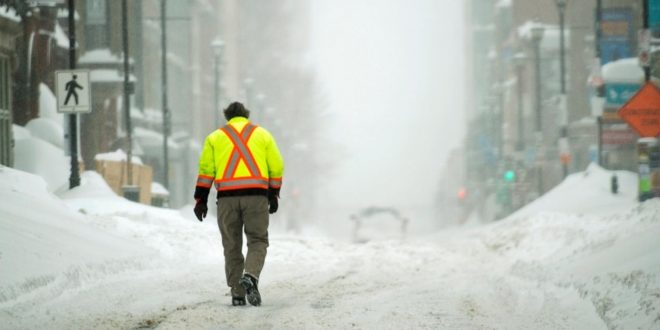‘Intense’ snowstorm brings parts of Atlantic Canada to standstill.
A wide swath of the Maritimes was shut down Monday by a massive, slow-moving blizzard that churned out a swirling mass of snow and ice pellets as it trudged across the region — and then refused to move on.
The heavy snow and powerful wind gusts — at times topping 120 kilometres per hour along the coast near Halifax — arrived in the region late Sunday and kept lashing the area throughout the day.
Scenes of deserted, snow-choked streets were a common sight as most residents heeded the weather warnings and stayed home.
Police in all three provinces urged drivers to stay off the roads amid white-out conditions. Public transit was shut down in several communities, and government offices were closed in Nova Scotia, P.E.I. and southern New Brunswick. Schools were shuttered and air travel ground to a halt.
As the nor’easter picked up strength, Halifax resident Rae Brown was shovelling off her covered porch, trying to stay ahead of a drift leaning on her front door. The sidewalk on Tulip Street was clogged with a metre of snow left behind by a lumbering front-end loader.
“I love it,” Brown said with a laugh. “I’m a winter-sexual. I love the snow. I love to ski, sledding, skating. It’s all good.”
But it wasn’t. The wind was howling along the side street, gusting at over 80 kilometres per hour. Brown, a teacher, winced as tiny shards of ice and snow hit her face.
“This is definitely a proper winter storm — a blizzard,” she said, her parka and knitted mittens caked in snow.
Environment Canada meteorologist Tracey Talbot said the storm was one of the biggest and strongest to hit the Maritimes in years, but she was not aware of any significant damage.
The storm was expected to keep pounding the region overnight, with Cape Breton having to endure more punishment on Tuesday. The eastern half of Newfoundland and Labrador was expected to feel the storm’s wrath by early Tuesday.
“This is definitely one of the most significant storms we’ve had in a long time,” Talbot said in an interview. “It’s definitely one of the worst in the Halifax area in years.”
Snowfall totals across Nova Scotia were expected to range from 20 to 60 centimetres. However, some areas in the Maritimes could be buried under as much as 75 centimetres amid higher drifts.
By late Monday afternoon, the heaviest snow was reported in the Fredericton area, where 68 centimetres had fallen at the airport. The highest unofficial total in Nova Scotia was in the province’s western end at Kejimkujik National Park, where 45 centimetres was on the ground.
By mid-afternoon, the Trans-Canada Highway was closed between Sackville, N.B., and the Nova Scotia border due to poor visibility.
Storm surges were reported along parts of the Atlantic coast.
On the Halifax waterfront, the harbour heaved upwards in the morning, pushing white-capped waves onto the city’s scenic boardwalk, leaving behind a slushy mess.
Kate Burns and her eight-month old daughter, Brooke, were trying to get home to Ottawa after a week in New Brunswick, but her scheduled flight Monday morning was cancelled, as was another flight in the afternoon.
“I’m really desperate to get home but I can understand delays with severe weather like this,” she said from her mother’s home in Rusagonis, near Fredericton. “It’s wild out there.”
She said she planned to fly to Montreal on Wednesday, and then drive the rest of the way to Ottawa.
Halifax resident Paul Giroux said the blizzard rated a seven or eight on a scale of 1 to 10. He said a snowstorm on Feb. 19, 2004, known as White Juan, was far worse. That storm hurled gusts in excess of 124 kilometres per hour and buried the region under almost a metre of snow.
“It was worse than this,” he said, looking over his ice-encrusted glasses. “It’s a lot of blowing and stuff … We’ve lived through worse.”
Giroux said he has lived in the Dartmouth area for more than 70 years.
“Hopefully, we won’t lose our power,” he said as a gust almost toppled him over. “But if we do, I’ve got extra firewood in. We have candles and food in our fridge and freezer.”
In downtown Halifax, a lone teacher was braving the blizzard to protest the Liberal government’s plan to table legislation that would impose a contract on 9,300 public school teachers.
Last week, the teachers rejected a third contract offer that had been endorsed by their union executive, prompting the majority government to seek a legislated settlement.
As the weather deteriorated in the afternoon, Premier Stephen McNeil postponed the emergency sitting until Tuesday night.
Rachel Creasor, a teacher from Glooscap Elementary School in Canning, N.S., had social media abuzz as she live streamed her protest on Facebook.
“There’s not a lot of people out here,” said Creasor as she took a break to warm up in her hotel room. “You can’t keep the snow from coming in your face. It’s coming from all directions … My signs are getting blown to pieces.”
Peter Spurway, who lives about 35 minutes outside Halifax in West Lawrencetown, said the visibility at his property was near zero as he tried to get to his barn to feed three ponies. He said he had to drive a truck to the building to avoid the fierce winds.
“Snow is going parallel to the ground at this point,” he said. “We just drove back into the open which was treacherous in that it was very, very hard to see because of the big gusts.”
Spurway, communications advisor for Halifax Stanfield International Airport, said the airport departures and arrivals boards were “a sea of red” as all flights were cancelled. The same thing happened in Charlottetown.
At one of Halifax’s busiest hospitals, emergency room nurse Quinn Bonner said the number of patients coming in was down from a typical day, but there was still plenty to do.
“We’re an essential service that never shuts down,” she said, adding that her 500-metre walk to the QEII Health Sciences Centre was marked by frequent white-outs. “We just make it work … We never close.”
Quinn said several co-workers who live farther away were expecting to spend the night at her home.
Nova Scotia Power, the province’s utility, said the storm had knocked out power to about 13,000 customers in the morning, and that number held steady until late in the afternoon. Most of the outages were reported along the Atlantic coast, where the gusts were the strongest.
“It will take time to get to sites as the storm progresses,” spokesman Matt Drover said in a statement. “We expect restoration efforts will be hampered.”
The blizzard moved into southern New Brunswick around 10 p.m. Sunday night. Transit buses were pulled from the roads in Fredericton, Saint John and Moncton.
By Monday afternoon, about 1,800 NB Power customers were in the dark, most of them along the Acadian Peninsula and the province’s southwest coast.
In Saint John, N.B., city officials asked parents to keep children from playing in the streets and tunnelling in snowbanks while the snowplows were still at work.
Utility spokeswoman Marie-Andree Bolduc said there may be delays getting to the affected areas.
“If the roads are too dangerous for the crews to head out then we will have to wait a little while until the storm passes,” she said.
Bolduc stressed that people should be prepared with emergency kits and not to use generators inside garages or homes.
During the recent ice storm in New Brunswick, two people died of carbon monoxide poisoning while 34 others were hospitalized.
Agencies/Canadajournal
 Canada Journal – News of the World Articles and videos to bring you the biggest Canadian news stories from across the country every day
Canada Journal – News of the World Articles and videos to bring you the biggest Canadian news stories from across the country every day



